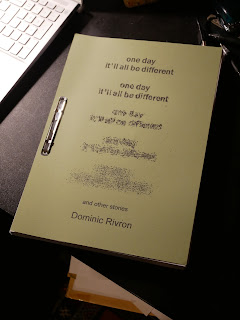A few of the stories were written earlier, but the vast majority have been written over the last eighteen months. They explore time, memory, the way we create the worlds we live in and the unknowability of other people. Suitable themes, you might think, for a pandemic lockdown. I was about to say that, despite that, I wouldn't describe it as a work of 'lockdown fiction', but as soon as I began to type out this thought I began to question it. None of the stories feature the pandemic, the characters meet freely, travel the country and explore their environments. However, the very things they do are the very things lockdown leads one to think about and perhaps yearn for. Several of the stories, too, involve characters becoming immersed in the topography of their immediate surroundings. This, I think, has also been one of the less unpleasant themes of the pandemic for a lot of people. So, is it a work of lockdown fiction? Perhaps it's not for me to say.
One of the great things about writing short stories is that, because they're short and self-contained, you can be bold. If you have an idea, explore it. Why not? In two or three thousand words' time you'll be doing something else. Short stories can be a liberation not only for the writer but also for the reader. Not enjoying the narrative? Don't worry, in a few pages you'll be embarking on a new one. Very occasionally (but, be reassured, if such things are not to your taste, not too often), it might lurch away from literary fiction into a hauntological world drawing on the tropes of fantasy or science fiction.
It's a good feeling, getting it printed out: it's reassuring to see the thing on paper and feel the weight of it in my hand.
Mr. Pepper went on to describe the white, hairless, blind monsters lying curled on the ridges of sand at the bottom of the sea, which would explode if you brought them to the surface, their sides bursting asunder and scattering entrails to the winds when released from pressure, with considerable detail and with such show of knowledge, that Ridley was disgusted, and begged him to stop.
"It’s the philosophers, it’s the scholars,” [Richard Dalloway] continued, “they’re the people who pass the torch, who keep the light burning by which we live. Being a politician doesn’t necessarily blind one to that, Mrs. Ambrose.”
“No. Why should it?” said Helen. “But can you remember if your wife takes sugar?”


One of the good things (there are many) of having a son like you is that you introduce me to new writing and new music and new art (not necessarily 'modern' - I mean 'new' to me.
ReplyDeleteThank you for saying.
DeleteCongrats on your short stories' project! You must have inherited your writing talent from your Mom!
ReplyDeleteThank you. Certainly if you grow up in a household where literature and music are important (making it and reading/listening to it) then these things seem important to you as an adult.
DeleteI love that you have completed your short stories project. You make me wish I still had the attention span required to read even a book of short stories. I don't anymore. My mind wanders after just a few words and goes off like this, "what should I make for dinner? Did I check the mail? Is the sky doing anything interesting?" My twin brother sends me haikus. He knows me. Seventeen syllables make me happy.
ReplyDeleteThanks for that. I like haiku too. Trying to think up 17 syllable statements can become obsessive
DeleteHi, I really enjoyed reading your post, and hope to read more. thank you so much for sharing this informative blog.
ReplyDeleteFishing by the River